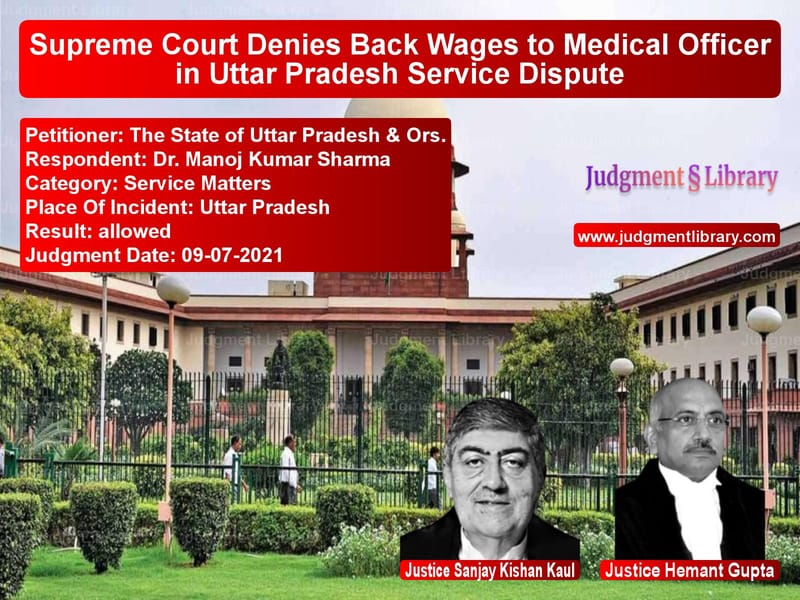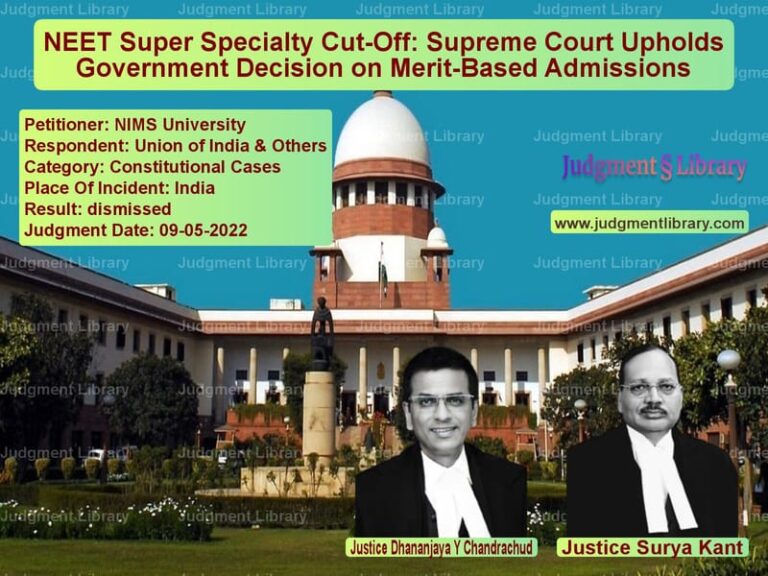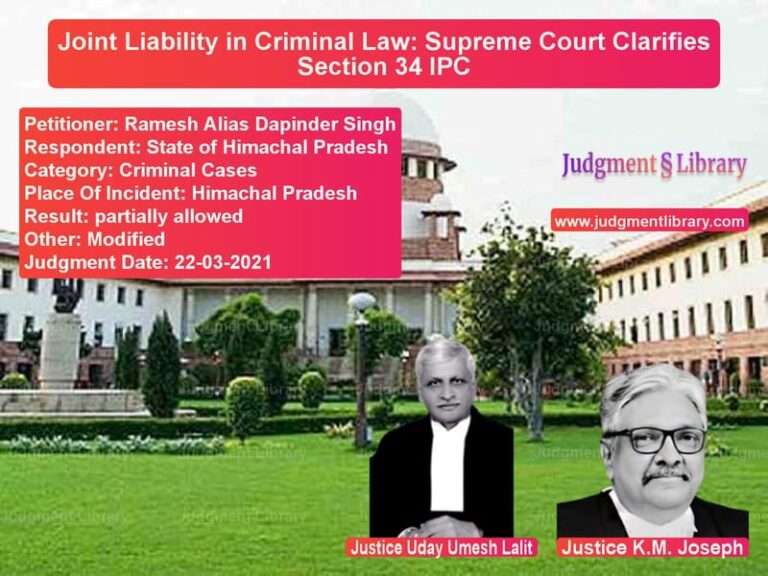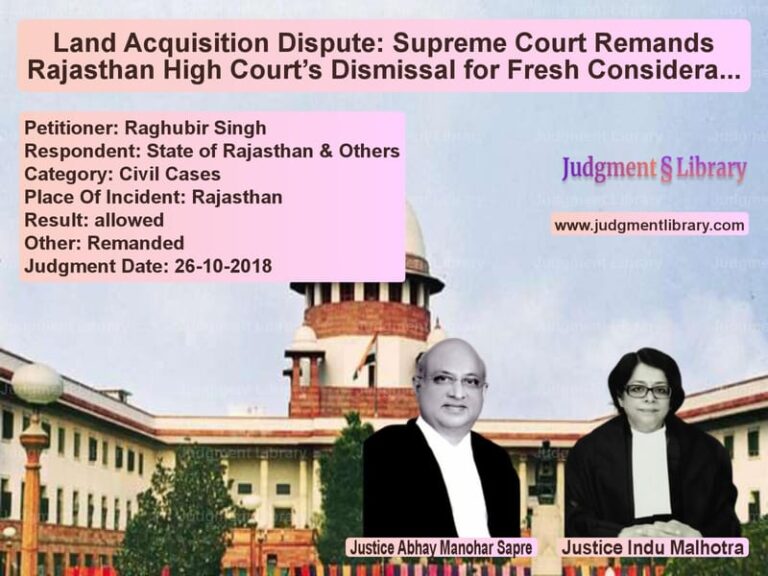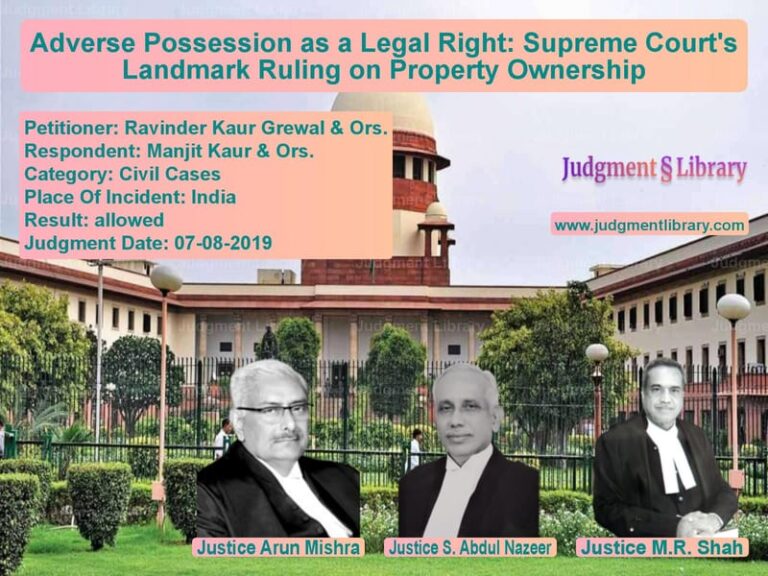Supreme Court Denies Back Wages to Medical Officer in Uttar Pradesh Service Dispute
The case of The State of Uttar Pradesh & Ors. v. Dr. Manoj Kumar Sharma highlights a dispute regarding the denial of back wages to a government medical officer. The Supreme Court ruled against the respondent, emphasizing that government officers cannot claim back wages for a prolonged period of non-service merely due to their failure to report to their assigned postings. The judgment underscores the importance of discipline, responsibility, and adherence to government service rules.
Background of the Case
The respondent, Dr. Manoj Kumar Sharma, was a medical officer posted in the State of Uttarakhand before the reorganization of the State of Uttar Pradesh. Following the bifurcation, medical officers were given the option to choose their parent state. The respondent opted for Uttar Pradesh and was accordingly transferred in 2002.
However, instead of reporting to his assigned post at Badaun, the respondent submitted a joining letter to the Director of Medical Health Services in Lucknow on September 19, 2003, requesting a posting in Muzaffarnagar, Ghaziabad, or Bijnor. As a result, he never physically reported for duty in Badaun.
Years later, he filed a writ petition in 2006, claiming that he was not given a proper posting order and seeking back wages for the period he remained unemployed. The Single Bench of the High Court ruled in his favor, and the Division Bench upheld the order, directing the state to pay 50% of back wages.
Legal Issues Before the Supreme Court
- Whether the respondent was entitled to back wages despite failing to report to his designated posting.
- Whether the High Court’s ruling directing payment of 50% of back wages was justified.
- Whether a government employee can dictate their place of posting and claim benefits despite non-compliance with service rules.
Arguments by the Petitioner (State of Uttar Pradesh)
The State of Uttar Pradesh, represented by its counsel, argued:
- The respondent was relieved by the Uttarakhand government and assigned a new posting in Badaun, but he failed to join.
- The failure to report to duty was deliberate, as he submitted his joining report to the wrong office and sought a location of his preference.
- Back wages cannot be granted for a period when no work was performed.
- There was no evidence to suggest that he was prevented from joining his assigned post.
- The respondent had engaged in private practice during this period and was gainfully employed elsewhere.
Arguments by the Respondent (Dr. Manoj Kumar Sharma)
The respondent argued:
- He was never properly informed of his transfer and was left waiting for an official posting order.
- The state failed to issue clear instructions regarding his posting.
- He could not be penalized for administrative lapses on the part of the government.
- The High Court’s decision to grant 50% of back wages was fair, considering the delay in issuing his posting order.
Supreme Court’s Observations
The Supreme Court ruled against the respondent, stating:
“It was not open to the writ petitioner to defy the order of transfer on the ground of non-communication when more than 100 medical officers were transferred by the same common transfer order. He stood relieved by the State of Uttarakhand and deliberately did not report at his place of posting.”
The Court observed that the respondent had engaged in private practice while allegedly waiting for a posting order, which contradicted his claim of being unemployed. It criticized the High Court for awarding back wages, stating that such an order would reward an employee for their own inaction.
Key Takeaways from the Judgment
- No Work, No Pay: The Supreme Court reaffirmed that government employees cannot claim wages for a period they did not work.
- Responsibility to Report: Employees must report to their assigned postings; failure to do so does not entitle them to benefits.
- Back Wages Cannot Be Claimed Due to Employee’s Own Fault: The Court ruled that the respondent’s deliberate non-reporting did not warrant compensation.
- Judicial Scrutiny of High Court Orders: The Supreme Court set aside the High Court’s ruling, emphasizing that judicial decisions must not encourage non-compliance with government service rules.
- Precedent on Service Disputes: This judgment serves as a precedent that back wages cannot be claimed without demonstrating continuous service.
Conclusion
The Supreme Court’s ruling in The State of Uttar Pradesh & Ors. v. Dr. Manoj Kumar Sharma underscores the importance of discipline and responsibility in government service. By denying back wages, the Court reinforced the principle that employees must comply with posting orders and cannot dictate their place of work.
This decision serves as a warning to government employees who attempt to exploit service rules for financial gains. The ruling ensures that government accountability is maintained and that employees fulfill their duties before claiming benefits.
Petitioner Name: The State of Uttar Pradesh & Ors..Respondent Name: Dr. Manoj Kumar Sharma.Judgment By: Justice Sanjay Kishan Kaul, Justice Hemant Gupta.Place Of Incident: Uttar Pradesh.Judgment Date: 09-07-2021.
Don’t miss out on the full details! Download the complete judgment in PDF format below and gain valuable insights instantly!
Download Judgment: the-state-of-uttar-p-vs-dr.-manoj-kumar-shar-supreme-court-of-india-judgment-dated-09-07-2021.pdf
Directly Download Judgment: Directly download this Judgment
See all petitions in Employment Disputes
See all petitions in Pension and Gratuity
See all petitions in Termination Cases
See all petitions in Judgment by Sanjay Kishan Kaul
See all petitions in Judgment by Hemant Gupta
See all petitions in allowed
See all petitions in supreme court of India judgments July 2021
See all petitions in 2021 judgments
See all posts in Service Matters Category
See all allowed petitions in Service Matters Category
See all Dismissed petitions in Service Matters Category
See all partially allowed petitions in Service Matters Category

